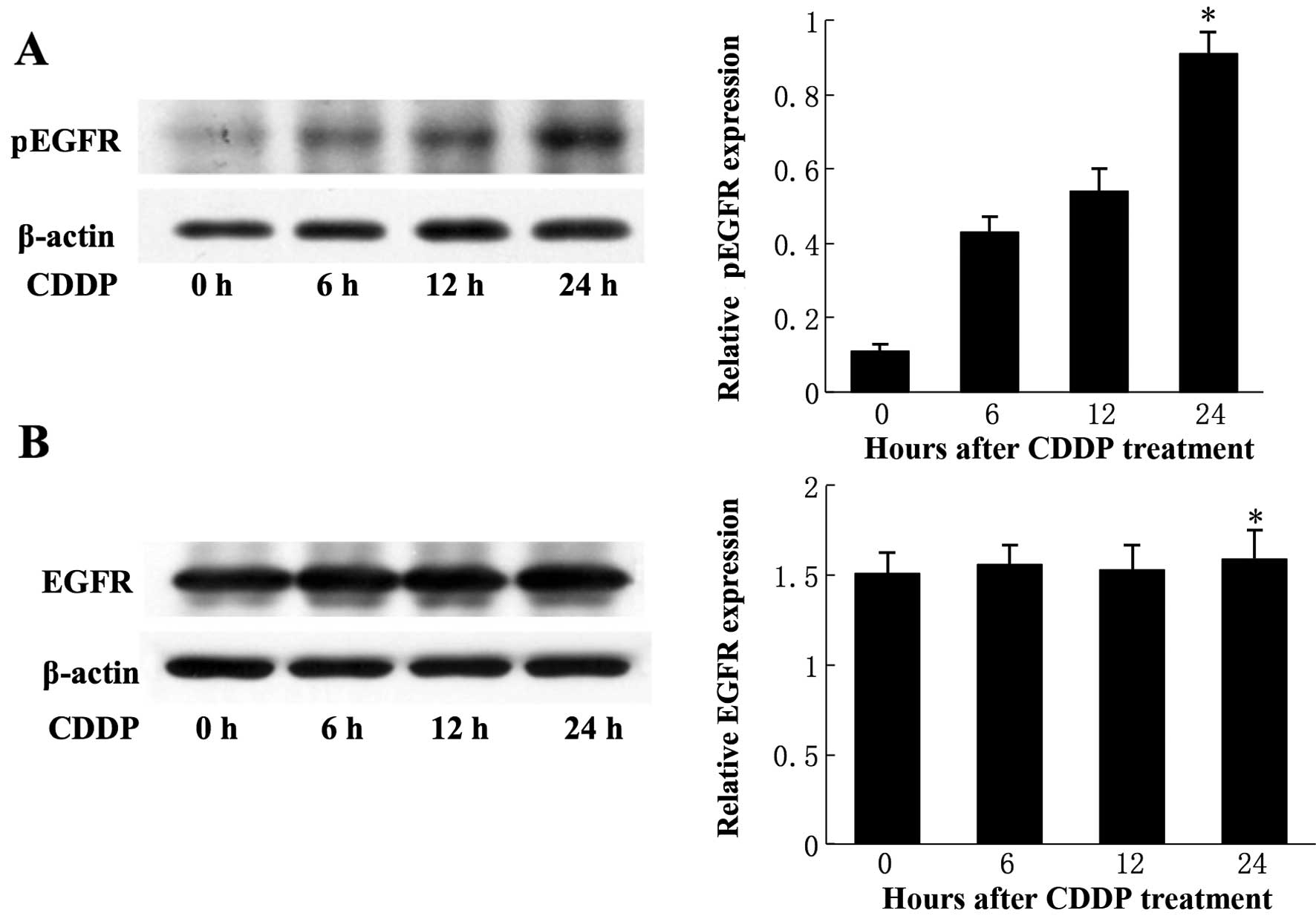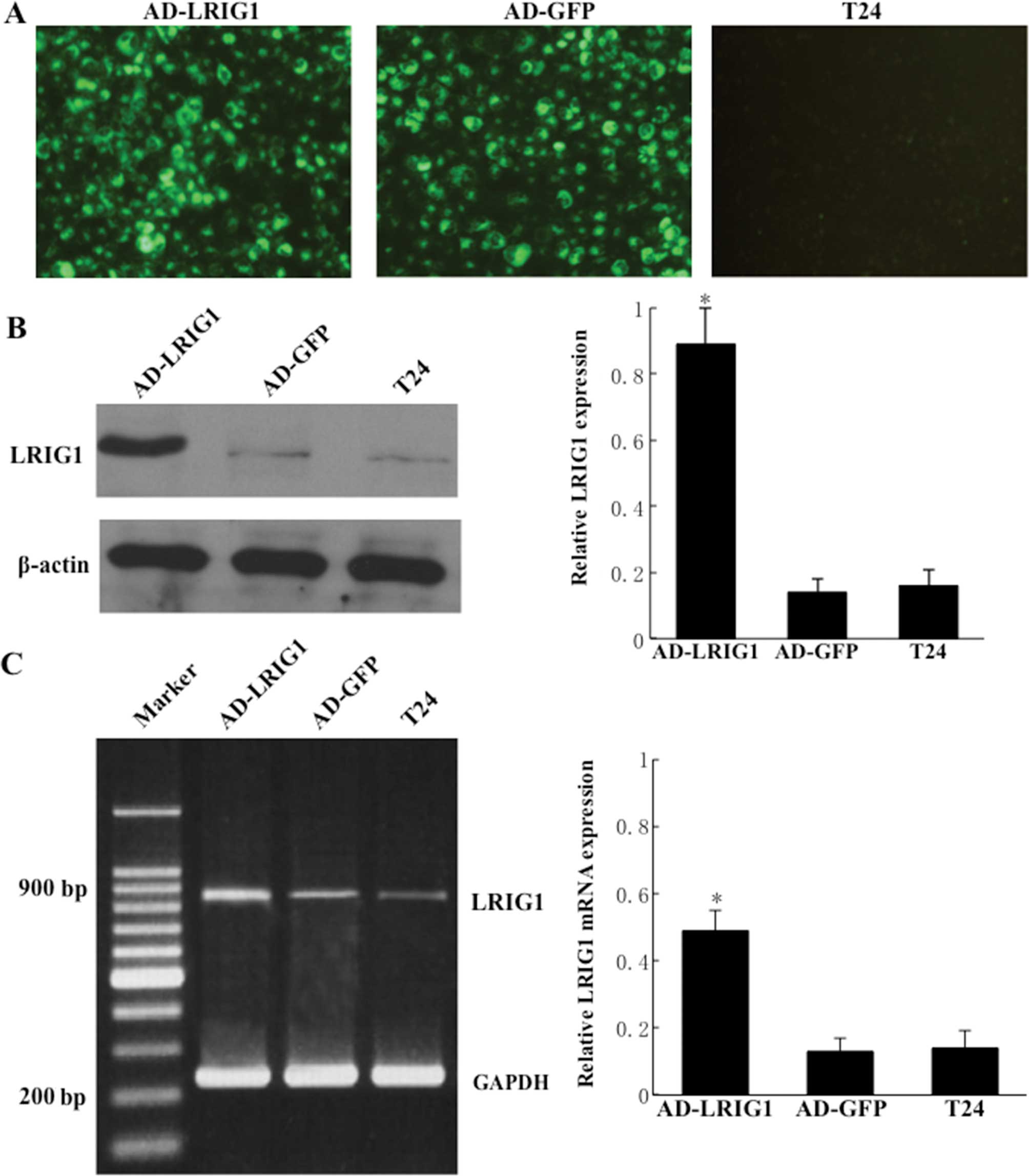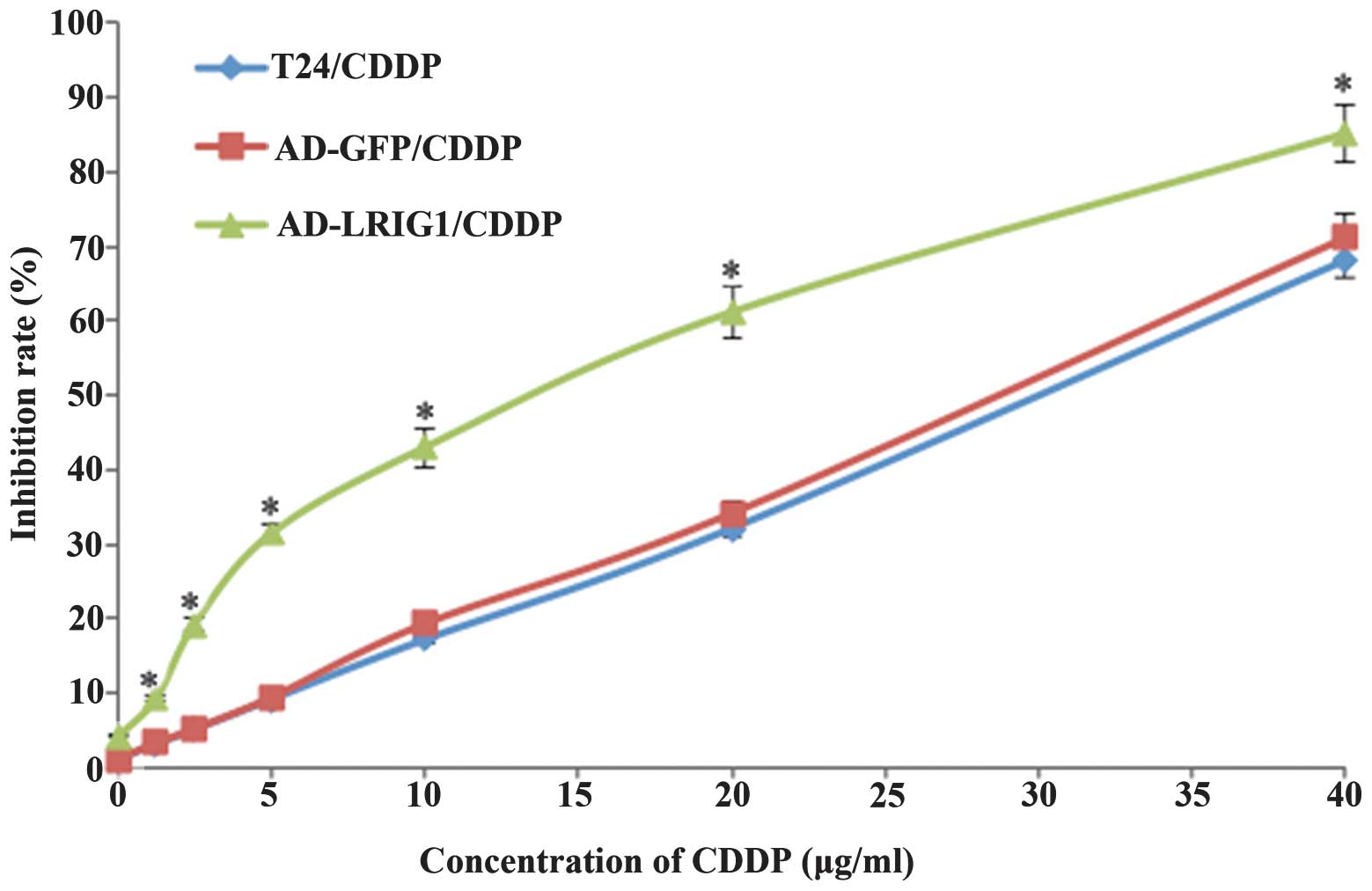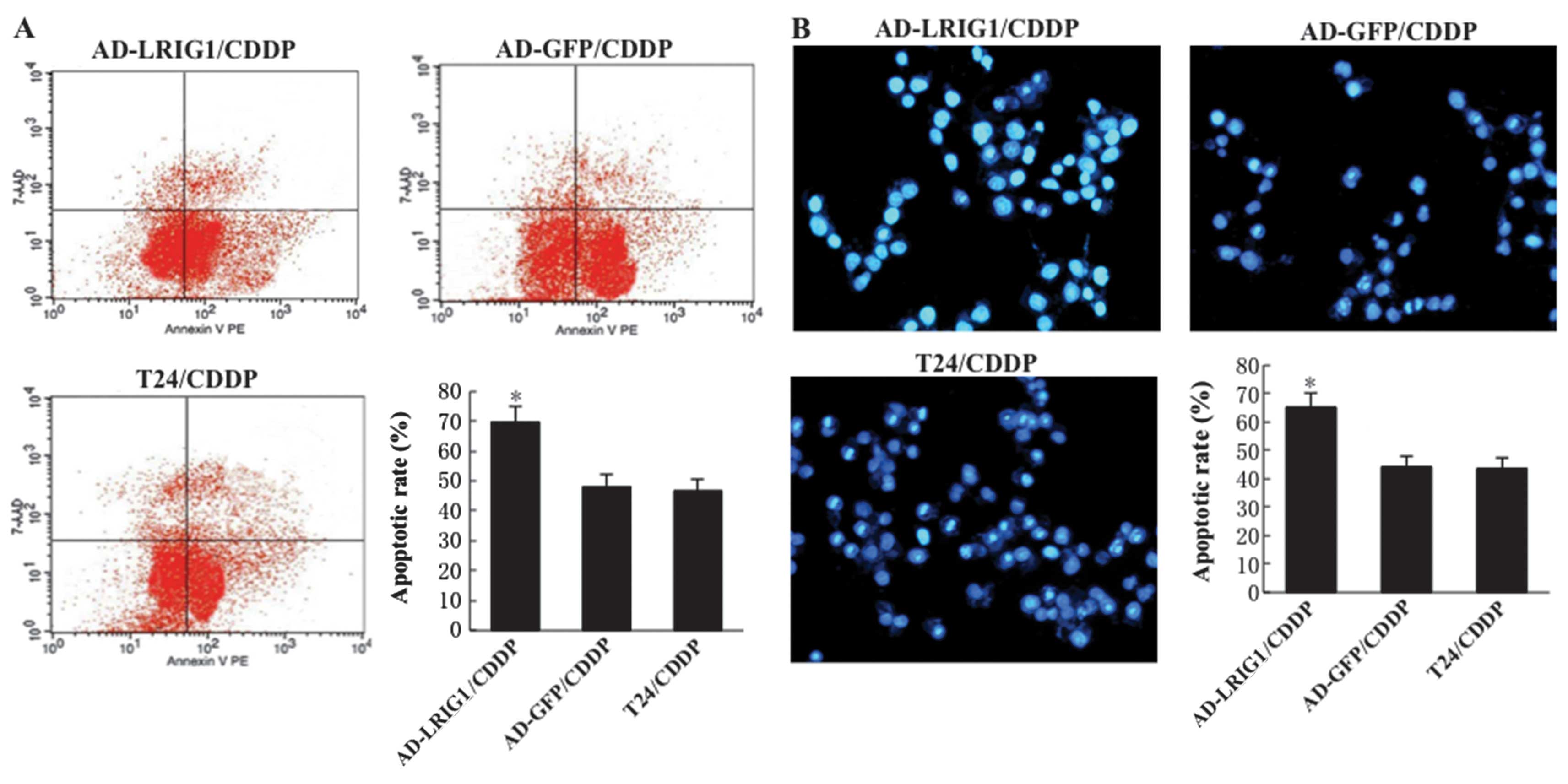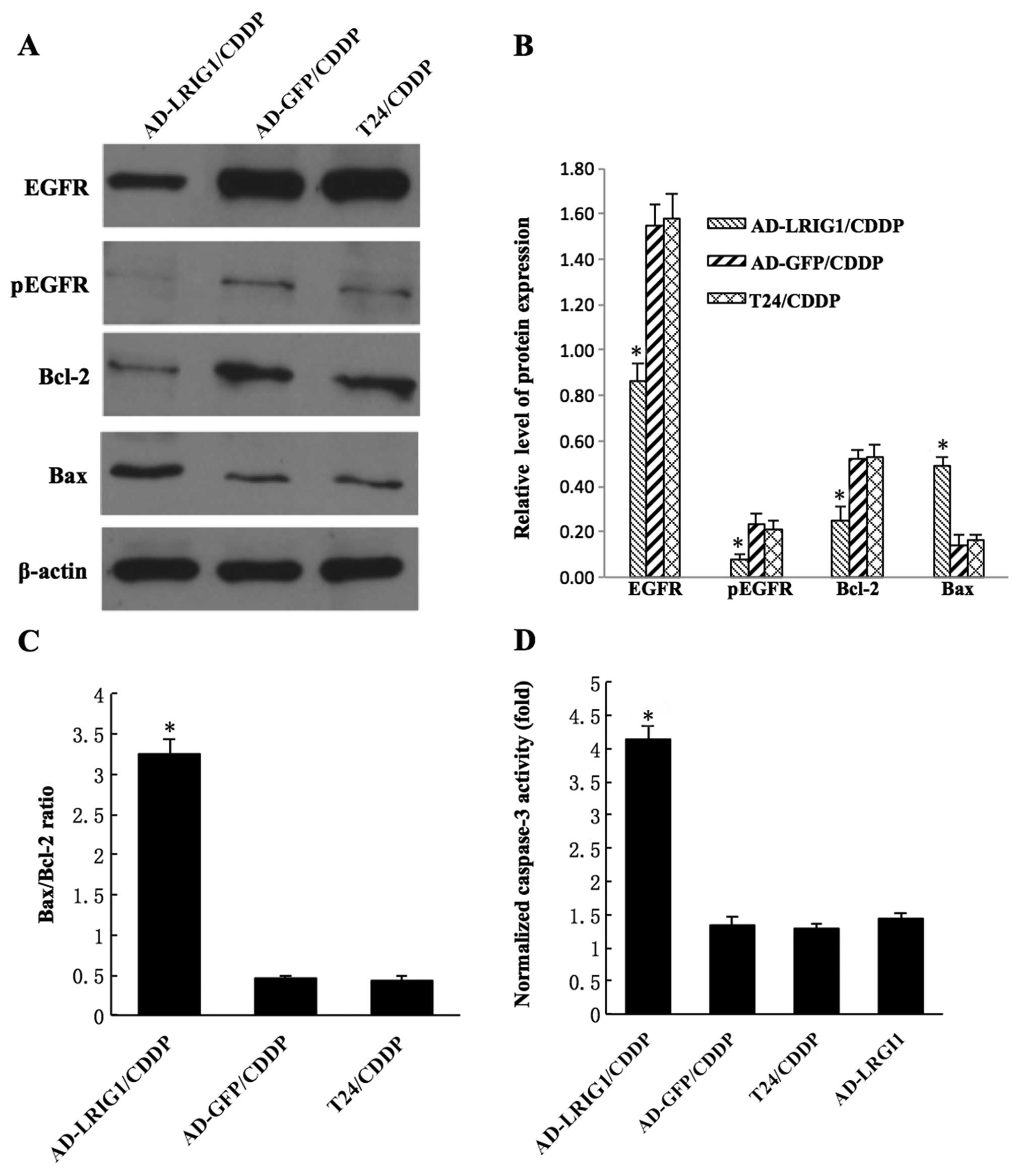|
1
|
Siegel R, Naishadham D and Jemal A: Cancer
statistics, 2013. CA Cancer J Clin. 63:11–30. 2013. View Article : Google Scholar : PubMed/NCBI
|
|
2
|
Herr HW, Dotan Z, Donat SM and Bajorin DF:
Defining optimal therapy for muscle invasive bladder cancer. J
Urol. 177:437–443. 2007. View Article : Google Scholar : PubMed/NCBI
|
|
3
|
Als AB, Sengelov L and von der Maase H:
Long-term survival after gemcitabine and cisplatin in patients with
locally advanced transitional cell carcinoma of the bladder: focus
on supplementary treatment strategies. Eur Urol. 52:478–486. 2007.
View Article : Google Scholar : PubMed/NCBI
|
|
4
|
Basu A and Krishnamurthy S: Cellular
responses to cisplatin-induced DNA damage. J Nucleic Acids.
2010:2013672010. View Article : Google Scholar : PubMed/NCBI
|
|
5
|
Ciarimboli G: Membrane transporters as
mediators of cisplatin side-effects. Anticancer Res. 34:547–550.
2014.PubMed/NCBI
|
|
6
|
Li QQ, Wang G, Liang H, Li JM, Huang F,
Agarwal PK, Zhong Y and Reed E: β-Elemene promotes
cisplatin-induced cell death in human bladder cancer and other
carcinomas. Anticancer Res. 33:1421–1428. 2013.PubMed/NCBI
|
|
7
|
Sekine I, Minna JD, Nishio K, Saijo N and
Tamura T: Genes regulating the sensitivity of solid tumor cell
lines to cytotoxic agents: a literature review. Jpn J Clin Oncol.
37:329–336. 2007. View Article : Google Scholar : PubMed/NCBI
|
|
8
|
Nilsson J, Vallbo C, Guo D, Golovleva I,
Hallberg B, Henriksson R and Hedman H: Cloning, characterization,
and expression of human LIG1. Biochem Biophys Res Commun.
284:1155–1161. 2001. View Article : Google Scholar : PubMed/NCBI
|
|
9
|
Hedman H, Nilsson J, Guo D and Henriksson
R: Is LRIG1 a tumour suppressor gene at chromosome 3p14.3? Acta
Oncol. 41:352–354. 2002. View Article : Google Scholar : PubMed/NCBI
|
|
10
|
Yang WM, Yan ZJ, Ye ZQ and Guo DS: LRIG1,
a candidate tumour-suppressor gene in human bladder cancer cell
line BIU87. BJU Int. 98:898–902. 2006. View Article : Google Scholar : PubMed/NCBI
|
|
11
|
Hedman H and Henriksson R: LRIG inhibitors
of growth factor signalling - double-edged swords in human cancer?
Eur J Cancer. 43:676–682. 2007. View Article : Google Scholar : PubMed/NCBI
|
|
12
|
Gur G, Rubin C, Katz M, et al: LRIG1
restricts growth factor signaling by enhancing receptor
ubiquitylation and degradation. EMBO J. 23:3270–3281. 2004.
View Article : Google Scholar : PubMed/NCBI
|
|
13
|
Yarden Y: The EGFR family and its ligands
in human cancer: signalling mechanisms and therapeutic
opportunities. Eur J Cancer. 37:3–8. 2001. View Article : Google Scholar
|
|
14
|
Pedersen MW, Melthorn M, Damstrup L and
Poulsen HS: The type III epidermal growth factor receptor mutation.
Biological significance and potential target for anti-cancer
therapy. Ann Oncol. 12:745–760. 2001. View Article : Google Scholar : PubMed/NCBI
|
|
15
|
Sebastian S, Settleman J, Reshkin SJ,
Azzariti A, Bellizzi A and Paradiso A: The complexity of targeting
EGFR signalling in cancer: from expression to turnover. Biochim
Biophys Acta. 1766:120–139. 2006.PubMed/NCBI
|
|
16
|
Kim WT, Kim J, Yan C, et al: S100A9 and
EGFR gene signatures predict disease progression in muscle invasive
bladder cancer patients after chemotherapy. Ann Oncol. 25:974–979.
2014. View Article : Google Scholar : PubMed/NCBI
|
|
17
|
Hiraishi Y, Wada T, Nakatani K, Tojyo I,
Matsumoto T, Kiga N, Negoro K and Fujita S: EGFR inhibitor enhances
cisplatin sensitivity of oral squamous cell carcinoma cell lines.
Pathol Oncol Res. 14:39–43. 2008. View Article : Google Scholar : PubMed/NCBI
|
|
18
|
Li F, Yang W, Guo D, Hu Z, Xu H and Ye Z:
LRIG1 combined with cisplatin enhances bladder cancer lesions via a
novel pathway. Oncol Rep. 25:1629–1637. 2011.PubMed/NCBI
|
|
19
|
Kelland L: The resurgence of
platinum-based cancer chemotherapy. Nat Rev Cancer. 7:573–584.
2007. View
Article : Google Scholar : PubMed/NCBI
|
|
20
|
Ta HT, Dass CR, Larson I, Choong PF and
Dunstan DE: A chitosan hydrogel delivery system for osteosarcoma
gene therapy with pigment epithelium-derived factor combined with
chemotherapy. Biomaterials. 30:4815–4823. 2009. View Article : Google Scholar : PubMed/NCBI
|
|
21
|
Zhang Y, Xing X, Zhan H, Li Q, Fan Y, Zhan
L, Yu Q and Chen J: EGFR inhibitor enhances cisplatin sensitivity
of human glioma cells. J Huazhong Univ Sci Technolog Med Sci.
31:773–778. 2011. View Article : Google Scholar : PubMed/NCBI
|
|
22
|
Yoshida T, Okamoto I, Iwasa T, Fukuoka M
and Nakagawa K: The anti-EGFR monoclonal antibody blocks
cisplatin-induced activation of EGFR signaling mediated by HB-EGF.
FEBS Lett. 582:4125–4130. 2008. View Article : Google Scholar : PubMed/NCBI
|
|
23
|
Geng X, Ye H, Feng Z, Lao X, Zhang L,
Huang J and Wu ZR: Synthesis and characterization of
cisplatin-loaded, EGFR-targeted biopolymer and in vitro evaluation
for targeted delivery. J Biomed Mater Res A. 100:2839–2848. 2012.
View Article : Google Scholar : PubMed/NCBI
|
|
24
|
Magkou C, Nakopoulou L, Zoubouli C, Karali
K, Theohari I, Bakarakos P and Giannopoulou I: Expression of the
epidermal growth factor receptor (EGFR) and the phosphorylated EGFR
in invasive breast carcinomas. Breast Cancer Res. 10:R492008.
View Article : Google Scholar : PubMed/NCBI
|
|
25
|
Tice DA, Biscardi JS, Nickles AL and
Parsonss SJ: Mechanism of biological synergy between cellular Src
and epidermal growth factor receptor. Proc Natl Acad Sci USA.
96:1415–1420. 1999. View Article : Google Scholar : PubMed/NCBI
|
|
26
|
Sheu JJ, Lee CC, Hua CH, et al: LRIG1
modulates aggressiveness of head and neck cancers by regulating
EGFR-MAPK-SPHK1 signaling and extracellular matrix remodeling.
Oncogene. 33:1375–1384. 2014. View Article : Google Scholar
|
|
27
|
Suzuki Y, Miura H, Tanemura A, et al:
Targeted disruption of LIG-1 gene results in psoriasiform epidermal
hyperplasia. FEBS Lett. 521:67–71. 2002. View Article : Google Scholar : PubMed/NCBI
|
|
28
|
Guo Z, Chen Q, Liu B, Tian D, Zhang S and
Li M: LRIG1 enhances chemosensitivity by modulating BCL-2
expression and receptor tyrosine kinase signaling in glioma cells.
Yonsei Med J. 55:1196–1205. 2014. View Article : Google Scholar : PubMed/NCBI
|
|
29
|
Williams GT and Smith CA: Molecular
regulation of apoptosis: genetic controls on cell death. Cell.
74:777–779. 1993. View Article : Google Scholar : PubMed/NCBI
|
|
30
|
Nakashima T, Miura M and Hara M:
Tetrocarcin A inhibits mitochondrial functions of Bcl-2 and
suppresses its anti-apoptotic activity. Cancer Res. 60:1229–1235.
2000.PubMed/NCBI
|
|
31
|
Gross A, McDonnell JM and Korsmeyer SJ:
BCL-2 family members and the mitochondria in apoptosis. Genes Dev.
13:1899–1911. 1999. View Article : Google Scholar : PubMed/NCBI
|
|
32
|
Adams JM and Cory S: The Bcl-2 apoptotic
switch in cancer development and therapy. Oncogene. 26:1324–1337.
2007. View Article : Google Scholar : PubMed/NCBI
|
|
33
|
Zhou W, Fu XQ, Liu J and Yu HG: RNAi
knockdown of the Akt1 gene increases the chemosensitivity of
gastric cancer cells to cisplatin both in vitro and in vivo. Regul
Pept. 176:13–21. 2012. View Article : Google Scholar : PubMed/NCBI
|
|
34
|
Chen C, Zhou H, Xu L, Xu D, Wang Y, Zhang
Y, Liu X, Liu Z, Ma D, Ma Q and Chen Y: Recombinant human PDCD5
sensitizes chondrosarcomas to cisplatin chemotherapy in vitro and
in vivo. Apoptosis. 15:805–813. 2010. View Article : Google Scholar : PubMed/NCBI
|















